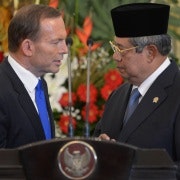Scrawling political calculus over Gonski's numbers
The reform of Australia’s school funding system has degenerated into an unseemly arm wrestle between federal leaders and premiers, and conflicting claims about whether money would go up or down over the next four years under Julia Gillard’s plan.
Without doubting there is room for dispute about numbers, parents have every cause to be disillusioned about the carryings on. They were inevitable when the government left trying to negotiate the deal so late. It should have been done last year when the electoral temperature was at least marginally less hot.
The conservative premiers of Victoria and Queensland, still to decide whether to sign up, are now pawns in the federal Gonski game.
Gillard is desperately trying to persuade them to get on board; the Coalition wants them to resist, to make it easier for it to dump what it inherits of the plan.
The Liberals yesterday savagely turned on one of their own, Barry O'Farrell, for signing. Federal Coalition education spokesman Christopher Pyne claimed O'Farrell had been “conned” and should pull out of the agreement.
The attack is quite insulting to the premier of the largest state, in essence saying that the NSW government did not know what it was doing.
Meanwhile the argy bargy continues with Victoria and Queensland (it is assumed the Labor states will sign, and that Western Australia won’t). Victorian education minister Martin Dixon said the figures on the negotiations were "so changeable" that it was hard to estimate the chance of an agreement. “I’d just give it 50-50 at this stage.” (The federal government says the figures haven’t changed.)
A spokesman for Queensland’s Campbell Newman said: “The premier still hopes to reach a deal on Gonski.” Newman would be writing to Gillard about her “ripping money out of universities and kindergartens” as well as the bureaucracy of the schools plan and its federal takeover of an area of state responsibility.
Both Victoria and Queensland claim they have not been told by Abbott to not sign. According to Newman’s spokesman Abbott said to the premier, “You’ve got to do what’s best for Queensland”. That doesn’t quite gel with O'Farrell’s account of the robust conversation he and Abbott had.
In making their decisions the premiers will take into account the numbers and the politics. They might want to help Abbott but they also have to think of their own constituencies.
They know there will be an Abbott government: if the Gillard deal is better than they would get under him, they have reason to lock it in with her and defy Abbott to scrap it. The worst that can happen is a few insults, like O'Farrell is getting.
But would they be better off? The plan runs for six years, with funding loaded at the back end – the current argument focuses on the four-year budget estimate period.
The Opposition claims the government is cutting $326 million over four years. Pyne says he bases this on calculating that “there are over $3.1 billion in cuts and redirections from the schools budget, being replaced with $2.8 billion in extra spending over the forward estimates”.
Pyne also accuses the government of shortchanging on indexation.
From this, he claims that extending the present system plus the rate of indexation the Opposition proposes (around 6 per cent, with some year-to-year variation) would deliver a better deal over the forward estimates period.
The government describes Pyne’s claims as “a joke”. It points to last week’s budget figures which show modest rises in schools funding over each year of the forward estimates.
It says that Pyne is basing his claims on previous budget forecasts when school funding indexation was estimated to be 5.6 per cent each year. But as a result of state cuts to schools, this rate went down to 3.9 per cent in the October budget update and will be 3 per cent in the coming years, the government says.
Gillard is distributing figures to show how much schools would lose if they don’t sign up to the six-year program. Pyne is attempting to muddy the water with figures claiming they will be worse off in the coming four years if the deal is accepted.
Treasurer Wayne Swan will enter the fray today, claiming in a speech to the think tank Per Capita that Abbott would cut to the bone (the government’s favourite phrase in relation to the Opposition at the moment) on schools funding “with one and a half million dollars being ripped from each school on average".
“He will use his commission of cuts to rip away our investments in education, putting politics first and our kids last.”
Swan will say that “Labor believes that education is the great enabler that smashes down barriers and builds a country of opportunity" while Abbott had confirmed "he does not share this belief. The Liberals would put Australia at the back of the class”.
The claims and numbers will continue to fly but the next critical stage of political judgement will be the decision, to come before June 30, by the key Victorian and Queensland premiers, and the reasons they give for what they do.
Michelle Grattan does not work for, consult to, own shares in or receive funding from any company or organisation that would benefit from this article, and has no relevant affiliations.
![]() This article was originally published at The Conversation. Read the original article.
This article was originally published at The Conversation. Read the original article.
















